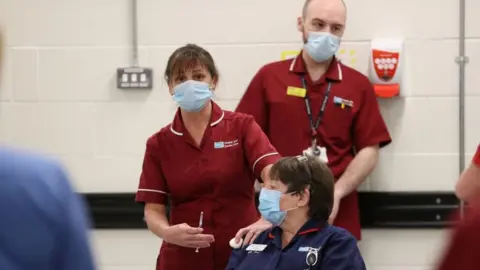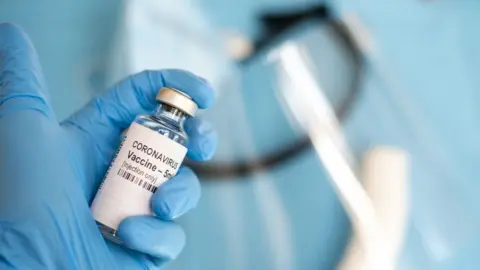Almost 10,000 care home residents receive vaccine
 Reuters
ReutersAlmost 10,000 care home residents in Northern Ireland have received the first dose of the Pfizer-BioNTech vaccine for Covid-19.
More than 46,000 first doses of the have been administered, according to the Department of Health.
A total of 25,623 health and social care staff - more than a third of the workforce - have received the jab.
That is in addition to the recent roll-out of the Oxford-AstraZeneca vaccine.
An update from the Department of Health shows 9,644 care home residents and 11,260 care home staff have received their first dose of the Pfizer-BioNTech jab.
Vaccination teams have visited 439 of the 483 care homes in Northern Ireland.
The department said that accounted for "every home that doesn't currently have a Covid-19 outbreak" and it expected "the remaining care homes to be vaccinated by mid-January".

Breakdown of vaccinations by health trust area
- Belfast Trust: 2,273 care home residents; 2,804 care home staff; 81 care homes. 7,818 HSC staff.
- Northern Trust: 1,912 residents; 2,496 care home staff; 101 care homes; 3,715 HSC staff.
- South Eastern Trust: 2,579 residents; 3,139 care home staff; 109 care homes; 6,594 HSC staff.
- Southern Trust: 1,687 residents; 1,606 care home staff; 65 care homes; 3,514 HSC staff.
- Western Trust: 1,288 residents; 1,301 care home staff; 58 care homes; 3,982 HSC staff.

BBC News NI understands that 30 GP surgeries volunteered to test the Oxford-AstraZenec vaccine rollout this week.
But by 12 January all surgeries across Northern Ireland will have enough of the vaccine to continue vaccinating those aged 80 and over.
By the end of January an additional 160,000 doses of the Oxford-AstraZeneca vaccine will be delivered to Northern Ireland.
"Over the course of this week and early next week every practice in Northern Ireland will get a delivery of the vaccine," Dr Alan Stout of the British Medical Association in Northern Ireland told BBC News NI.
He said it would not be enough to vaccinate all over-80s but there would be "plenty" more doses coming in the weeks ahead.
"Realistically this is going to take several months to get everyone vaccinated," he said.
 Getty Images
Getty ImagesMeanwhile, the Department of Health has defended its plans to change the length of time between delivering the first and second vaccine doses.
It said that the Joint Committee on Vaccination and Immunisation (JCVI) has recommended a strategy of prioritising first doses of vaccines to as many people as possible.
"We know that after the first dose of either the Oxford-AstraZeneca or the Pfizer-BioNTech vaccine within two to three weeks there is a very high level of immunity," a spokesperson from the department said.
"After 21 days - irrespective of which vaccine you have - that immunity does not drop off."
On Tuesday, BBC News NI asked the department to clarify its vaccination schedule, something which has been outlined in Scotland and England.
The department is yet to respond.
'Working tirelessly'
"Our vaccination programme has achieved a great deal in a very short space of time," a department spokesperson said.
"We are very grateful to the many colleagues across our trusts and GP practices who are working tirelessly to make sure that we get the vaccine to patients and healthcare staff."
The spokesperson added the positive results did "not mean that we can drop our guard".
They also urged the public to continue to follow public health advice around social distancing and face coverings.
